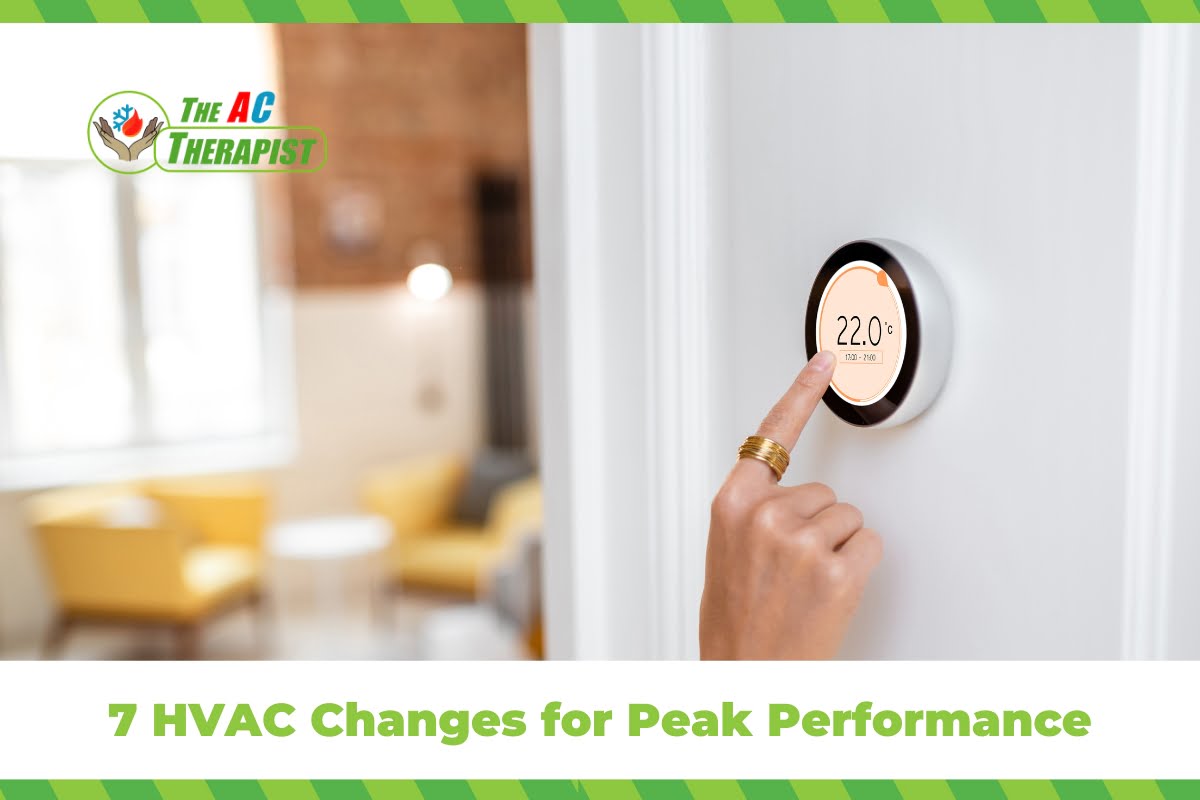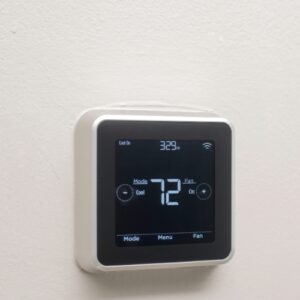7 HVAC Changes for Peak Performance
In the quest for a comfortable home environment, our HVAC systems serve as silent guardians, tirelessly working to keep us cool in the blistering heat of summer and warm during the chill of winter. Yet, despite their crucial role, these systems often go unnoticed—until, of course, they falter. The key to ensuring our comfort and safety lies not just in reacting to problems as they arise but in preventing them before they occur. This is where the significance of HVAC maintenance and efficiency optimization becomes paramount.
Maintaining an efficient HVAC system is not merely a matter of comfort; it is a critical component of energy conservation, cost savings, and environmental stewardship. An efficiently running system consumes less energy, reduces our carbon footprint, and significantly lowers our utility bills. Furthermore, proper maintenance and strategic upgrades can extend the life of our HVAC units, delaying the financial and environmental costs of replacement.
However, optimizing the efficiency and extending the lifespan of your HVAC system goes beyond mere routine maintenance. It involves a comprehensive approach that encompasses everything from regular check-ups and cleanings to smart upgrades and lifestyle adjustments. By embracing both preventive measures and modern technology, homeowners can ensure their HVAC systems operate at peak efficiency, providing reliable comfort for years to come.
In this detailed exploration, we will unveil essential changes and practices that can significantly enhance the efficiency and longevity of your HVAC system. From simple filter replacements to smart thermostat installations, and from sealing leaks to considering an upgrade to a high-efficiency model, we’ll guide you through actionable steps to optimize your home’s heating, ventilation, and air conditioning. Whether you’re looking to reduce energy consumption, save on utility costs, or simply extend the life of your HVAC system, this guide offers the insights and advice you need to make informed decisions and achieve a comfortable, efficient home.
Smart Swaps for HVAC Efficiency: Upgrade Your Comfort and Cut Costs
1. Replace Old Filters with High-Efficiency Ones
Old Practice: Allowing filters to become clogged with dust and debris, strains the HVAC system and reduces air quality. New Swap: Regularly changing to high-efficiency particulate air (HEPA) filters to improve airflow and system efficiency, enhancing indoor air quality and reducing energy consumption.
2. Upgrade to a Smart Thermostat from a Manual One
Old Practice: Using a manual or non-programmable thermostat, leads to inefficient heating and cooling patterns. New Swap: Installing a smart thermostat that adjusts your home’s temperature based on patterns and preferences, saving energy and reducing wear on the system.
3. Swap Outdated HVAC Units for Energy-Efficient Models
Old Practice: Keeping an old, inefficient HVAC system that uses more energy and often requires frequent repairs. New Swap: Upgrading to an ENERGY STAR-certified HVAC system that uses less energy for the same level of comfort and is less likely to break down, offering long-term savings.
4. Transition from Ignoring Ductwork to Regular Duct Maintenance
Old Practice: Overlooking duct maintenance, leading to leaks, blockages, and inefficient system operation. New Swap: Regularly inspecting, cleaning, and sealing ductwork to ensure optimal airflow and efficiency, thereby reducing energy loss and improving system longevity.
5. Replace Inconsistent Maintenance with Regular Professional Check-Ups
Old Practice: Sporadic or no professional maintenance, leading to unnoticed issues that can escalate into costly repairs. New Swap: Scheduling regular professional HVAC inspections to identify and fix minor issues before they become major problems, ensuring the system runs efficiently.
6. Switch from Reactive Repairs to Preventive Upgrades
Old Practice: Waiting for the system to fail before making any changes or repairs. New Swap: Proactively replacing parts that are known to wear out over time (like capacitors, fans, and belts) before they fail, to avoid unexpected breakdowns and improve system reliability.
7. Change from Using Fixed Speed Compressors to Variable Speed Models
Old Practice: Operating HVAC systems with fixed-speed compressors that are either fully on or fully off, leading to inefficiencies. New Swap: Upgrading to variable speed compressors that can adjust cooling and heating output to exactly match the demand, significantly increasing energy efficiency and comfort.
Implementing these swaps within your HVAC system not only increases its efficiency and lifespan but also contributes to a more comfortable, healthier living environment. By moving from outdated practices to smart, energy-efficient upgrades, homeowners can enjoy significant savings on utility bills, reduce their environmental impact, and ensure their HVAC system operates smoothly for years to come.
Preventive Maintenance Tips
Preventive maintenance is crucial for ensuring the efficiency, longevity, and reliability of your HVAC system. Regular upkeep helps avoid unexpected breakdowns, enhances performance, and can significantly extend the life of your system. Here are some essential preventive maintenance tips to help keep your HVAC in top condition:
1. Regular Filter Changes
- Why It Matters: A clean filter ensures efficient airflow, improves indoor air quality, and prevents your system from overworking, which can lead to premature wear.
- How Often: Check filters monthly and replace them at least every 90 days, or more frequently if you have pets, allergies, or live in a dusty area.
2. Seasonal HVAC Inspections
- Why It Matters: Professional inspections can identify minor issues before they escalate into major problems, ensuring your system is prepared for peak seasons.
- How Often: Schedule inspections twice a year: in spring for the cooling system and in fall for the heating system.
3. Cleaning Components
- Why It Matters: Dirt and debris can accumulate on coils and in ducts, reducing efficiency and potentially causing damage.
- DIY Tips: Keep the area around outdoor units clear of debris, and gently clean accessible components. However, for deep cleaning, especially of the internal parts and ductwork, it’s best to hire professionals.
4. Checking and Sealing Ductwork
- Why It Matters: Leaks or holes in ductwork can significantly reduce system efficiency by losing cooled or heated air before it reaches your living spaces.
- How Often: Visually inspect exposed ducts annually for signs of wear and have them professionally tested for leaks every few years.
5. Thermostat Calibration
- Why It Matters: An accurately calibrated thermostat ensures your HVAC system heats and cools your home as efficiently as possible.
- DIY Tips: Check your thermostat’s accuracy with another thermometer. If it’s off, consider recalibrating or replacing it with a more accurate, programmable model.
6. Refrigerant Level Checks
- Why It Matters: Too much or too little refrigerant can make your system less efficient, increase energy costs, and reduce the lifespan of your equipment.
- Professional Service: Refrigerant levels and system pressures should be checked by a professional to ensure they meet your system’s specifications.
7. Electrical Connections and Components
- Why It Matters: Loose electrical connections can cause unsafe operation of your system and reduce the life of major components.
- Professional Service: Have a technician tighten electrical connections and measure voltage and current on motors during your regular maintenance visit.
8. System Upgrades
- Why It Matters: Outdated components may not only be less efficient but could also be more prone to breaking down.
- Considerations: Discuss potential upgrades with your HVAC professional, such as energy-efficient motors, smart thermostats, or newer, more efficient units.
Following these preventive maintenance tips can help ensure your HVAC system runs smoothly, efficiently, and safely year-round, providing comfortable living conditions while keeping your energy bills in check. Regular maintenance not only saves you money in the long run by preventing costly repairs and replacements but also contributes to a healthier environment by maintaining good air quality in your home.
Smart Upgrades for Efficiency
Implementing smart upgrades is a strategic way to enhance the efficiency of your HVAC system. These HVAC changes not only boost the system’s performance but also lead to significant energy savings and improved home comfort. Let’s delve into several impactful HVAC changes that represent smart upgrades for any homeowner looking to optimize their heating, ventilation, and air conditioning system.
Smart Thermostats: A Key HVAC Change
One of the most effective HVAC changes you can make is upgrading to a smart thermostat. This HVAC change allows for more precise control over your heating and cooling, adapting to your schedule and preferences to reduce energy use while maintaining comfort. Smart thermostats learn your habits and adjust the HVAC settings accordingly, ensuring that energy is not wasted heating or cooling an empty home. This HVAC change is not just about convenience; it’s about making your HVAC system work smarter, not harder.
Energy-Efficient HVAC Units: Essential HVAC Changes
Another significant HVAC change involves upgrading to energy-efficient HVAC units. Modern HVAC systems are designed with efficiency in mind, and this HVAC change can significantly reduce your energy consumption and lower utility bills. When considering HVAC changes, look for units with a high SEER (Seasonal Energy Efficiency Ratio) rating for cooling and a high AFUE (Annual Fuel Utilization Efficiency) rating for heating. These HVAC changes not only benefit your wallet but also contribute to environmental sustainability.
Sealing and Insulation: HVAC Changes for Reducing Energy Loss
HVAC changes should also include improving your home’s sealing and insulation. Inefficient ductwork and inadequate insulation can lead to substantial energy loss, forcing your HVAC system to work harder to maintain comfortable temperatures. This HVAC change involves sealing leaks in ductwork and enhancing insulation in walls, attics, and floors. By making these HVAC changes, you can significantly improve system efficiency and reduce energy costs.
Variable Speed Compressors: Advanced HVAC Changes
Investing in HVAC changes like variable speed compressors for your air conditioning system represents an advanced step towards efficiency. Unlike traditional compressors that only operate at full capacity, variable-speed compressors adjust their output to match the cooling demand precisely. This HVAC change leads to reduced energy consumption, less wear and tear on the system, and greater overall comfort due to more consistent temperatures throughout your home.
Zoning Systems: Customizable HVAC Changes
Implementing zoning systems is another smart HVAC change that enhances efficiency by allowing you to heat or cool only the areas of your home that are in use. This HVAC change involves installing multiple thermostats and control valves or dampers within your ductwork to create different climate zones. Such HVAC changes enable personalized comfort settings while optimizing energy use across different sections of your home.
Regular Maintenance: The Foundational HVAC Change
While exploring HVAC changes for efficiency, never underestimate the value of regular maintenance. This foundational HVAC change involves periodic check-ups and cleanings to ensure your system operates at peak efficiency. Regular maintenance, a critical HVAC change, helps identify and address minor issues before they escalate, extending the lifespan of your system and maintaining its efficiency.
By prioritizing these HVAC changes, homeowners can significantly enhance the efficiency, performance, and longevity of their HVAC systems. Smart upgrades, from smart thermostats to energy-efficient units and beyond, represent wise investments in your home’s comfort, energy consumption, and environmental impact. Embrace these HVAC changes to enjoy a more comfortable, sustainable, and cost-effective home environment.
Lifestyle Changes for Better Efficiency
Incorporating lifestyle changes into your daily routine can significantly contribute to the efficiency of your HVAC system. These HVAC changes, centered around your habits and how you use your HVAC system, can have a profound impact on energy consumption, utility bills, and the overall comfort of your home. Let’s explore several lifestyle HVAC changes that can enhance the performance and efficiency of your heating, ventilation, and air conditioning systems.
Adjusting Thermostat Settings: A Simple HVAC Change
One of the easiest HVAC changes you can make is to adjust your thermostat settings according to the season and when you’re home or away. Setting your thermostat a few degrees higher in the summer and lower in the winter when you’re not home can lead to significant energy savings. This HVAC change ensures that you’re not wasting energy heating or cooling an empty house, which is a straightforward yet effective way to optimize your system’s efficiency.
Embracing Natural Ventilation: An Environmental HVAC Change
Another beneficial HVAC change is to take advantage of natural ventilation whenever possible. Opening windows and creating cross-ventilation during cooler parts of the day can help reduce your reliance on air conditioning. This HVAC change not only freshens up your home without the need for energy consumption but also helps to reduce the workload on your HVAC system, extending its lifespan.
Smart Appliance Use: HVAC Changes in Daily Habits
Making HVAC changes in how and when you use appliances can also influence your system’s efficiency. Using heat-generating appliances like ovens, dryers, and dishwashers during cooler times of the day or night can help minimize the additional heat load on your HVAC system during hot days. This HVAC change can prevent your system from working overtime, thereby conserving energy and reducing wear and tear.
Regular Filter Replacement: A Maintenance-Related HVAC Change
Incorporating regular filter replacements into your household maintenance routine is an essential HVAC change that can significantly impact your system’s efficiency. A clean filter ensures optimal airflow, reduces energy consumption, and helps maintain good indoor air quality. This HVAC change is simple but crucial for preventing your system from overworking due to blocked or dirty filters, leading to better efficiency and longer system life.
Using Fans to Complement Your HVAC System: An Effective HVAC Change
Implementing the use of ceiling or oscillating fans as part of your cooling strategy is an effective HVAC change. Fans can make a room feel cooler without the need to lower the thermostat setting, reducing the cooling load on your HVAC system. This HVAC change can create a more comfortable living environment while conserving energy and minimizing the strain on your system.
Mindful Energy Consumption: A Holistic HVAC Change
Adopting a mindset focused on mindful energy consumption represents a holistic HVAC change that can influence all aspects of your home life. Being aware of how your activities affect your HVAC system’s workload and making conscious decisions to reduce energy use where possible are key components of this HVAC change. From turning off lights in unoccupied rooms to ensuring windows and doors are sealed properly when your HVAC system is running, every little action contributes to greater efficiency.
By integrating these lifestyle HVAC changes, you can play a significant role in enhancing the efficiency and longevity of your HVAC system. These changes, ranging from simple adjustments to more mindful daily practices, not only lead to savings on energy costs but also promote a more sustainable living environment. Embrace these HVAC changes to make a positive impact on your home’s comfort and your HVAC system’s performance.
Maximize Comfort and Efficiency: Essential HVAC Changes from The AC Therapist
As The AC Therapist, we’ve journeyed together through a comprehensive exploration of HVAC changes designed to enhance the life and efficiency of your heating, ventilation, and air conditioning system. From strategic upgrades like installing smart thermostats and energy-efficient HVAC units to adopting lifestyle changes that reduce energy consumption, each recommendation is a step towards a more comfortable, efficient, and sustainable home.
Embracing these HVAC changes not only leads to immediate benefits in terms of improved air quality and reduced energy bills but also lays the foundation for a longer-lasting HVAC system. By adopting a proactive approach to maintenance, including regular filter replacements and seasonal inspections, you’re investing in the health of your HVAC system and, by extension, the comfort of your living environment.
At The AC Therapist, we understand the importance of a reliable HVAC system to your home’s comfort and your family’s well-being. That’s why we’re committed to providing insights and services that empower you to make informed decisions about your HVAC care. Remember, the most significant change starts with a commitment to ongoing maintenance and a willingness to adopt new habits for energy efficiency.
We encourage you to review the changes discussed and consider which ones can be implemented in your home. Whether you’re ready to make smart upgrades or adjust your daily habits for better efficiency, The AC Therapist is here to support you every step of the way. Together, we can ensure that your HVAC system remains a reliable source of comfort for years to come.
Embrace these changes, and enjoy the peace of mind that comes with knowing you’re doing everything possible to extend the life and enhance the efficiency of your HVAC system. If you have any questions or need further assistance implementing these HVAC changes, don’t hesitate to reach out to The AC Therapist. Let’s work together to optimize your home’s comfort and efficiency.













